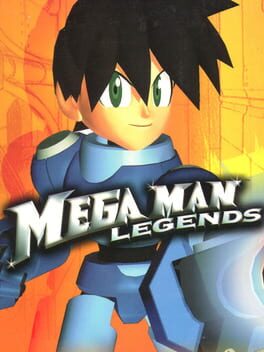Thriving off the pastiche of early morning 90s anime, somewhere between Astro Boy, Pokémon and One Piece, Mega Man Legends wears the sanguine smile of a lost decade of anime, a face recognizable to only the most jaded of despondent 20-something weebs and old-head otakus. Conceptually light, the game mostly treads the same footing as it’s inspiration: our plucky protagonists crash-land on a distant island, foil bumbling sky pirates, and unearth treasure and secrets aplenty in the name of fortune and getting back home. It’s simple, it’s clean, it’s the foundation for a generation of anime writing, but like the greatest baby anime, the concept isn’t what sells you on Mega Man Legends: It’s simply a gateway to some stellar vibes.
Driven by low-stakes and a peaceful atmosphere, the game brings to mind the feeling of waking up just in time to catch Pokémon before you run off to school, the emotions bound to that half-hour slice, the hominess of the entertainment you grow up with. Like an audio-visual security blanket, Mega Man Legends is nostalgia given form, a work built not for overshadow competition and breaking new ground, but to provide an experience that felt immediately familiar, yet uniquely new.
Even compared to its predecessors, Mega Man Legends sits in sharp contrast; as if in reaction to the lethal edge and melodrama of the Mega Man X series, a story of betrayal, loss, death, and general misery, Legends expounds boundless optimism in the face of adversity, unbreakable bravery in the face of crushing odds, and a bunch of goofy doofuses filling a cast of instantly lovable faces. If anything, the game designed to take advantage of the new technology afforded to the PlayStation feels like a much more genuine reconciliation of the tone of the original Mega Man series, while the game designed to retain the old-school fan base was deeply tinged by the style and aesthetic of gritty, grimy 90s OVAs and anime.
Talking about the mechanics in a game like this feels pointless: You are there, without question, to experience the story, meet the characters, and appreciate the world the game has developed. The gameplay itself exists as a method to feed that experience to you; while deeply dated, and reflective of the past of game design in its philosophy, it stands less as a foundational flaw of the game and more part of the overall story. In an inversion of John Carmack’s infamous quote, the gameplay is expected to be there, but it’s not important.
It’s difficult to speak uncritically about a game with such an established cultural relevance, and it’s equally difficult to find something meaningful to say. For me, Mega Man Legends is the epitome of a bygone era of anime, a touchstone on a generation of anime that inspired artists, writers and directors through the present day. It’s watching Yu-Gi-Oh as you wake up, it’s catching Digimon during a lazy Sunday. It’s emblematic of nostalgia as an idea, and how it relates to the media we approached as children, and how those tastes shape what we love and appreciate now.
Driven by low-stakes and a peaceful atmosphere, the game brings to mind the feeling of waking up just in time to catch Pokémon before you run off to school, the emotions bound to that half-hour slice, the hominess of the entertainment you grow up with. Like an audio-visual security blanket, Mega Man Legends is nostalgia given form, a work built not for overshadow competition and breaking new ground, but to provide an experience that felt immediately familiar, yet uniquely new.
Even compared to its predecessors, Mega Man Legends sits in sharp contrast; as if in reaction to the lethal edge and melodrama of the Mega Man X series, a story of betrayal, loss, death, and general misery, Legends expounds boundless optimism in the face of adversity, unbreakable bravery in the face of crushing odds, and a bunch of goofy doofuses filling a cast of instantly lovable faces. If anything, the game designed to take advantage of the new technology afforded to the PlayStation feels like a much more genuine reconciliation of the tone of the original Mega Man series, while the game designed to retain the old-school fan base was deeply tinged by the style and aesthetic of gritty, grimy 90s OVAs and anime.
Talking about the mechanics in a game like this feels pointless: You are there, without question, to experience the story, meet the characters, and appreciate the world the game has developed. The gameplay itself exists as a method to feed that experience to you; while deeply dated, and reflective of the past of game design in its philosophy, it stands less as a foundational flaw of the game and more part of the overall story. In an inversion of John Carmack’s infamous quote, the gameplay is expected to be there, but it’s not important.
It’s difficult to speak uncritically about a game with such an established cultural relevance, and it’s equally difficult to find something meaningful to say. For me, Mega Man Legends is the epitome of a bygone era of anime, a touchstone on a generation of anime that inspired artists, writers and directors through the present day. It’s watching Yu-Gi-Oh as you wake up, it’s catching Digimon during a lazy Sunday. It’s emblematic of nostalgia as an idea, and how it relates to the media we approached as children, and how those tastes shape what we love and appreciate now.

maradona
2 years ago